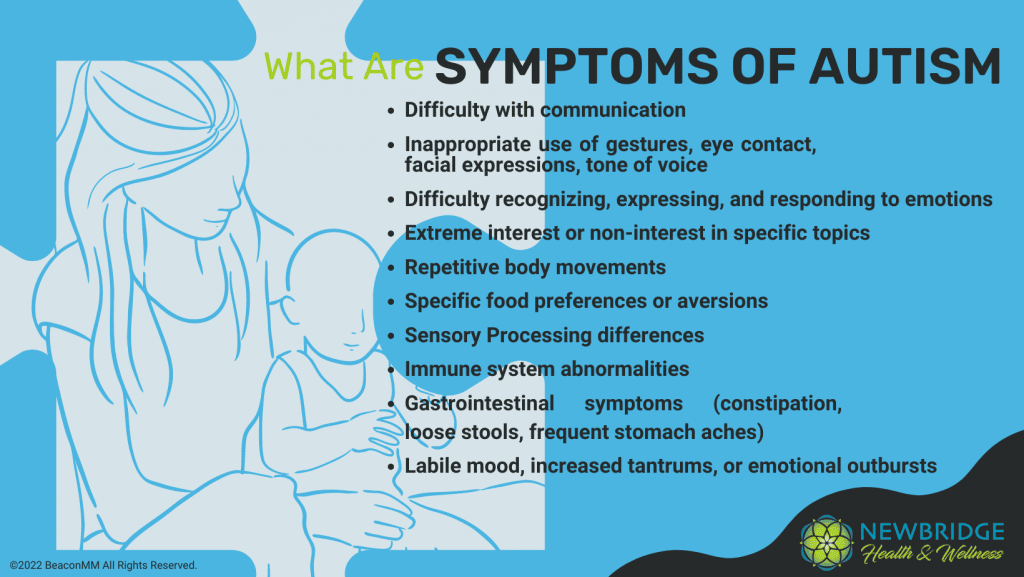Understanding the causes of autism can be a difficult thing. And although there are tests to help determine if your child has autism, parents often have to be the ones to recognize the signs.
Some disorders may not show until later when environmental factors trigger symptoms that reveal your child may have a neurodevelopmental disorder. One disorder that can showcase itself in that way includes autism or autism spectrum disorder. Many people associate autism with a genetic condition but may not realize that the child’s environment and exposures can play as a factor that helps trigger the disorder.
So, is autism genetic? Here’s a guide on understanding the environmental factors in developing autism, signs to look for, and how you can help treat autism with functional medicine.
Are you interested in learning how functional medicine can help your family? Contact Newbridge Health and Wellness to learn more!
What Is Autism?
Autism or autism spectrum disorder is a neurodevelopmental disorder characterized by various symptoms, depending on the autism phenotype. Although different in every person, symptoms typically include difficulties with social interaction, repetitive behaviors, expressing emotions, difficulty transitioning, gastrointestinal issues, sensory issues, immune system issues, and more. More research is being done on autism, including categorizing autism as an autoimmune disease affecting the brain and nervous system.
More research is needed to confirm this, but abnormal immune system responses in autism are typical and identified as part of the disorder. The CDC has reported that one in 36 eight-year-olds has autism. Over the last few decades, the number has risen. In 1992, one in 150 children was born and diagnosed with autism; in 2000, one in 88 children was born and diagnosed.
In Minnesota, our numbers are higher than the national average, with one in 35 children diagnosed with autism in 2014. With the rising number of children diagnosed with autism, research must continue to understand better the environmental influences of why this is occurring and how to treat autism and its signs.
Purely genetic disorders would not rise as quickly as we have seen autism rise. If researchers can continue to uncover the environmental influences and lawmakers can ban toxic substances linked to increasing rates, we will see much more progress in understanding, diagnosing, and treating this disorder.
Research in these areas will help the medical community and society-at-large understand some of the underlying factors influencing autism, avoid these factors, treat underlying conditions, and give families the best opportunities to help their child get diagnosed and find a lifestyle that allows them to live healthy, happy, high functioning, and meaningful lives.
What Are the Symptoms of Autism?

Autism is a spectrum disorder, meaning that the symptoms can vary from person to person. They may be severe or unnoticeable, but parents can notice signs that their child may have autism. The symptoms can show themselves through environmental behaviors, including:
- Difficulty with communication
- Inappropriate use of gestures, eye contact, facial expressions, tone of voice
- Difficulty recognizing, expressing, and responding to emotions
- Feeling uncomfortable in social situations
- Extreme interest or non-interest in specific topics
- Repetitive body movements (rocking, flapping hands, or spinning)
- Resistance to change
- Inability to speak or delayed speech
- Difficulty carrying on back and forth conversation
- Specific food preferences or aversions
- Sensory processing differences
- Immune system abnormalities
- Gastrointestinal symptoms (constipation, loose stools, frequent stomach aches)
- Lining up objects
- Labile mood, increased tantrums, or emotional outbursts
Autism symptoms may not encompass all the symptoms listed above. However, many of these signs may be prevalent with severe behaviors. If you’ve noticed some or multiple of these symptoms, you should take your child to a medical practitioner to help get a diagnosis and find the best treatment plan.
How to Diagnose Autism
Diagnosing autism doesn’t just include identifying the signs and symptoms. For your child to be diagnosed with autism, we must rule out a few other disorders, including Rett’s Disorder, Fragile X Syndrome, and Childhood Disintegrative Disorder. Once those are ruled out, your child has to show the following signs to meet the DSM-V diagnostic criteria, including:
- Two social impairments
- At least one language-based impairment
- At least two repetitive behavior patterns
In recent years, diagnosis has moved to a spectrum including specifiers identifying the presence or non-presence of characteristics. For instance, some people diagnosed with Asperger’s ten years ago would now be diagnosed with autism without language or intellectual impairment.
Some characteristics that help with diagnosing and treating autism include the association with another medical condition, association with an environmental factor, and more. Practitioners are trying to identify autism spectrum disorder and aim to treat autistic individuals with an individual approach, targeting where they are on the spectrum and their underlying medical and social-emotional issues.
This approach to individual care is how Functional Medicine practitioners care for their patients. Newbridge Health and Wellness takes a multi-disciplinary approach to treating autism, focusing on identifying and treating underlying root causes.
Are you interested in how a comprehensive, multi-disciplinary functional medicine approach can help treat autism? Contact Newbridge Health and Wellness today to get started!
What Causes Autism?
There is no singular known cause of autism, but some research suggests that it is caused by a combination of environmental (more-so) and genetic (less-so) factors. Environmental factors can trigger genetically predisposed individuals, which appears to be why autism is rising at such a fast rate. It is becoming increasingly clear that the myriad of autism symptoms is triggered by the underlying medical and environmental causes, with a minority associated with genetic causes.
Some genetic variants or combinations of genetic variants have been identified to predispose autism, although genetic variants alone don’t typically lead to autism. Some people with genetic variants are never diagnosed with autism.
Although autism runs in the family, it hasn’t been proven that genetics predispose children to the condition. There can be an increased risk of autism, but there is no determining factor of genetic predisposition that will lead to its development, and environmental factors need to be considered.
In addition to potential genetic predisposition, environmental risk factors can play a large role in autism. Exposures during the prenatal period when the embryo and fetus are very susceptible to environmental exposures may contribute to an autism diagnosis. It’s recommended during pregnancy to avoid toxins, heavy metals, chemicals, pesticides, herbicides, infectious exposures, and stress. Likewise, environmental exposures in early childhood may be contributing factors.
Adding supplements like Vitamin D and Folate to the diet has been proven to reduce the risk of autism and other nutritional factors.
More research is being done to help understand how environmental factors affect people with autism. Some other environmental risk factors can include:
- Advanced parental age at the time of conception
- Prenatal exposure to air pollution, certain pesticides and herbicides, and other toxins
- Maternal obesity, diabetes, or immune system disorders
- Maternal thyroid disorders
- Extreme prematurity or very low birth weight
- Any birth difficulty leading to periods of oxygen deprivation to the baby’s brain
These early life environmental exposures can be the root cause behind why someone has autism. Understanding what may have caused the disorder and how the person with autism copes with their condition can help determine treatment plans that help.
How to Treat Autism With Functional Medicine
Newbridge Health and Wellness offers many treatment options for autism using a lifestyle, therapy, and nutrition-based Functional Medicine approach. This approach to care looks at the underlying root contributors and causes. It helps correct these, adding foods and nutrients if they are low and reducing harmful exposures or removing things that could be causing harm, like bad microbes in the gut, EMF/ radiation exposure, underlying infections, or toxins in the body, and restoring proper function through various treatment modalities and therapies.
Examining underlying health and environmental factors that may affect the individual’s disorder allows practitioners to determine a treatment plan to address those issues, increasing the patient’s quality of life and function. We have had patients who successfully reversed or lost their diagnosis using this approach, which is not guaranteed but always exciting when it happens.
A key foundation is to eat a healthy, nutrient-dense diet. Sometimes children on the spectrum cannot tolerate many foods due to sensory or other issues, so we address this through occupational therapy, masgutova neurologic reflex integration (MNRI) therapy, and feeding therapy. Often there are nutrient deficiencies that need to be addressed. The communication between the gut and the brain has been more extensively studied over the last few years, which has helped increase our understanding of neuropsychiatric conditions. The gut is responsible for about 80% of your immune system function. It helps the body to make vitamins, detoxify and make neurotransmitters, all of which can help many people with autism when the gut function is improved. Thus, changing to a healthier diet can immensely help the brain and body.
Detoxification is another treatment option where different nutrients and other compounds help the body naturally detoxify endogenous toxins (typically the byproducts of poor digestion or gut dysbiosis) and exogenous (external) toxins, which helps with feeling healthy and optimal functionality. We utilize the functional medicine approach to help treat underlying microbiome imbalances in the gut to restore it for optimal function. This allows for improved nutrient absorption, neurotransmitter production, decreased inflammation, detoxification, immune function, vagal nerve tone, and more.
At Newbridge Health and Wellness, we also passionately provide care for women in the preconception and pregnancy periods to help to do our best to prevent autism and other neurodevelopmental and physical conditions in babies and children. We take a comprehensive approach to maternal and paternal health to optimize reproductive health and pregnancy outcomes, which is perhaps the most important work of all.
Are you interested in personalized care for you or someone you love with autism or other neurodevelopmental disorders, or do you wish to increase the odds of preventing neurodevelopmental disorders in the first place? Contact Newbridge Health and Wellness today to get started!


